

7 essential books about comedy by comedians · Inventory. 1.
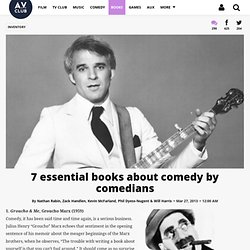
Groucho & Me, Groucho Marx (1959)Comedy, it has been said time and time again, is a serious business. Julius Henry “Groucho” Marx echoes that sentiment in the opening sentence of his memoir about the meager beginnings of the Marx brothers, when he observes, “The trouble with writing a book about yourself is that you can’t fool around.” It should come as no surprise to Groucho fans that he goes on to spend at least as much time offering up one-liners as he does delving into the history of how he and his brothers—Leonard (Chico), Arthur (Harpo), Herbert (Zeppo), and, in the early years, Milton (Gummo)—slowly but surely worked their way through the vaudeville circuit, eventually becoming the toast of Broadway before transitioning to film and taking Hollywood by storm. 2. 3. 4. 5. 6. 7.
For five essential books about TV, five essential books about film, and five essential books about popular music, see our book Inventory. The Best Comedy Writing Books. I was recently asked on twitter (I actually have a human follower?)
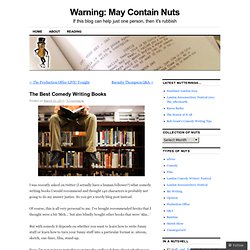
What comedy writing books I would recommend and thought 140 characters is probably not going to do my answer justice. So you get a wordy blog post instead. Of course, this is all very personal to me. I’ve bought recommended books that I thought were a bit ‘Meh…’ but also blindly bought other books that were ‘Aha…’ But with comedy it depends on whether you want to learn how to write funny stuff or learn how to turn your funny stuff into a particular format ie. sitcom, sketch, one-liner, film, stand-up. Now, I’m not going to turn this post into the endless debate about whether you can teach someone to be funny or whether you can learn to write. Trope (literature) Rhetoricians have closely analyzed the great variety of "turns and twists" used in poetry and literature and have provided an extensive list of precise labels for these poetic devices.
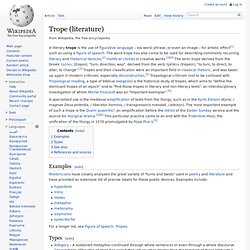
Examples include: For a longer list, see Figure of speech: Tropes. Allegory – A sustained metaphor continued through whole sentences or even through a whole discourse. For example: "The ship of state has sailed through rougher storms than the tempest of these lobbyists. "Antanaclasis – is the stylistic trope of repeating a single word, but with a different meaning each time. References Jump up ^ Miller (1990). Sources "Silva Rhetorica". rhetoric.byu.edu. TROPES. 7 essential books about comedy by comedians · Inventory. The Ultimate Comedy Library: 57 Books Every Comedy Fan Should Read. Books are smart and reading is good for you!
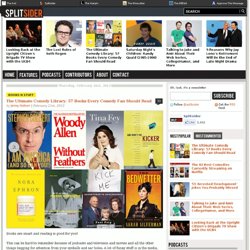
This can be hard to remember because of podcasts and television and movies and all the other things begging for attention from your eyeballs and ear holes. A lot of funny stuff is in the media, we get it! But books can be funny, too. Just look at all the comedians making books! Comedians are always writing books about themselves, or about comedy history, or about writing, or just fun stuff called "fiction. " Because we are here to help, we made for you a list of some of the best comedy books — broken down into memoirs, humor, history, and fiction — that would be right at home on any comedy lover's shelf (or on your "E-reader").
Memoirs Tina Fey chronicles her life from nerd-dom to motherhood and everything in between, including her work on Second City, , , and more. Oswalt mixes stories of his formative years as a D&D-playing nerd with other vignettes including poems, movie reviews, greeting cards. Amazon. This Is a Book: Demetri Martin: 9780446539692: Amazon.com. Truth in Comedy: The Manual for Improvisation: Charna Halpern, Close, Kim Howard Johnson: 9781566080033: Amazon.com. Dad Is Fat: Jim Gaffigan: 9780385349079: Amazon.com. Amazon. Tina Fey's Bossypants. You-dont-have-to-be-psychotic-to-work-this-crowd-study-finds-comedians-are-more-inclined-to-suffer-mental-health-issues-9062672. An “unusual personality structure” with traits such as those similar to bipolar could be the secret to making people laugh, according to research published in the British Journal of Psychiatry.
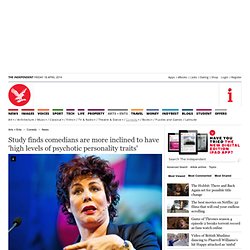
The report used statistical data gathered from more than 500 comedians who completed a specially devised questionnaire. The researchers said the belief that creativity is associated with madness has increasingly been researched by psychologists and psychiatrists, yet added: “comedy and humour have been largely neglected”. As well as Fry, the report references Spike Milligan, Paul Merton and David Walliams among those who have talked openly about their experiences with mental health problems. Gordon Claridge, retired professor of the University of Oxford’s department of experimental psychology who authored the report with undergraduate Victoria Ando, said: “Obviously not all comedians are like this, but the trend does seem these personality traits are more common. It is that idea of the sad clown.”